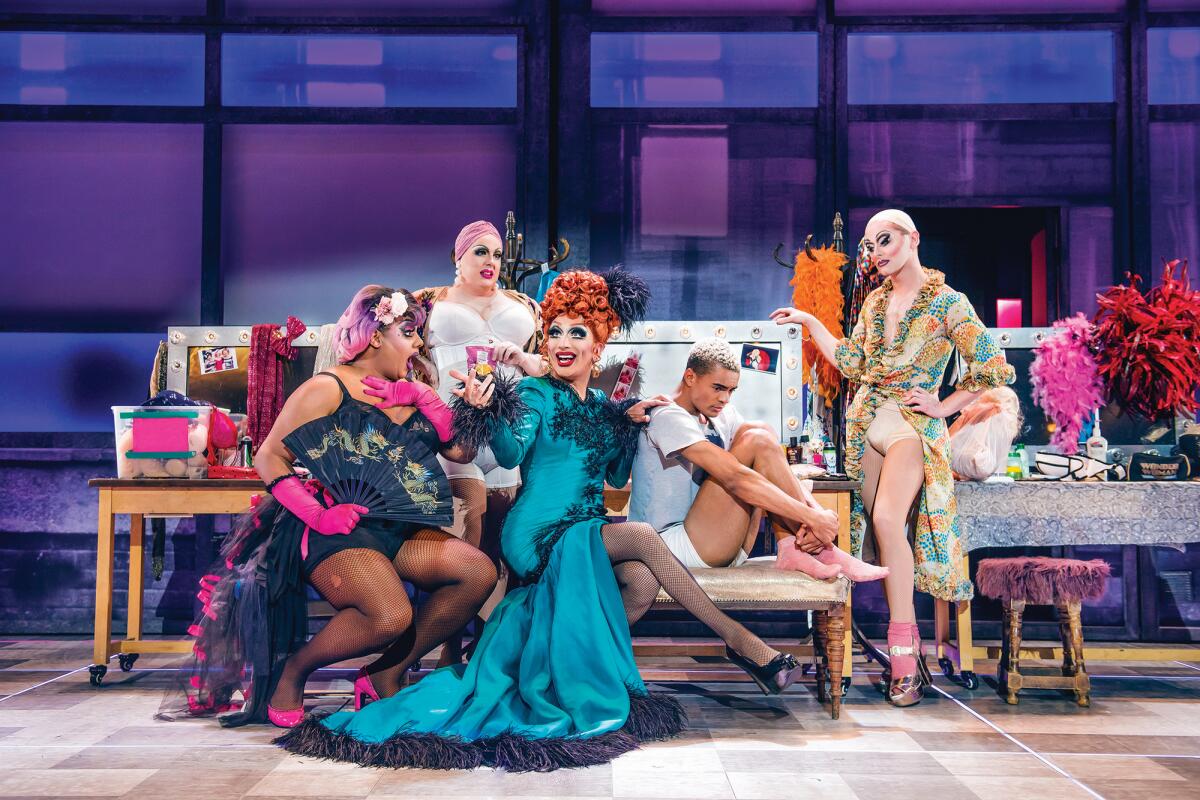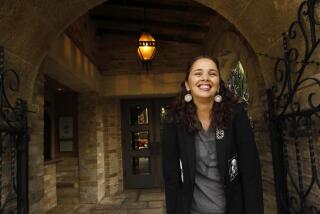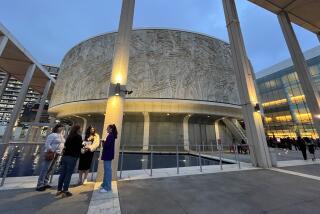How Center Theatre Group is pushing forward with live shows — even amid the Omicron surge

- Share via
Less than a month after canceling the remaining 22 performances of “A Christmas Carol” due to breakthrough COVID-19 infections in the cast and crew, Center Theatre Group is gearing up for the Jan. 16 start of its next show at the Ahmanson Theatre, the North American premiere of “Everybody’s Talking About Jamie.”
CTG’s Twitter feed features excited posts from the show’s star, Layton Williams, who is part of the UK company bringing the musical from London’s West End to Los Angeles. Williams recently recovered from a holiday bout of the virus, which he posted about on Instagram, and which CTG Managing Director and CEO Meghan Pressman says is somewhat comforting given the fact that a previous infection might make another less likely.
Reducing the risk of illness backstage and in the audience is the name of the game as CTG presses forward with its season in the midst of a near vertical surge of Omicron-driven infections, with more than 250,000 cases of COVID-19 detected in L.A. County in the past eight days and a predicted peak still weeks away. While prominent events like the Grammys have been postponed and others, like the Sundance Film Festival, go virtual for yet another year, CTG is banking on cumulative experience to help it safely dodge virus-related shutdowns.
The company’s optimism remains intact even as other prominent local arts groups make different decisions. On Tuesday, for example, Pasadena Playhouse announced that its upcoming show, “Teenage Dick,” which was set to open Feb. 1, will pivot to streaming only. In-person performances are now scheduled to begin again in late March. And the Soraya at Cal State Northridge has now canceled three of its January shows, and postponed the fourth until April.
“Unlike what we were saying even a year ago, we have learned how to live through these precedented times,” CTG’s Pressman says over the phone.
She laughs knowingly after uttering the word “precedented,” acknowledging that until now “unprecedented” has been the No. 1 descriptor for COVID’s effects on the performing arts — the devastating shutdowns, the ongoing dark stages, the sweeping layoffs. Pressman’s feeling that COVID-19 has become the devil we know rather than the devil we don’t is in keeping with swiftly changing public sentiment in the face of the staggering Omicron surge. There is less palpable fear in the air as the vaccinated and boosted come to terms with the fact that an increasing chance of infection will likely come with milder symptoms.
Except when it doesn’t. And who ends up getting super sick remains a bit of a guessing game. Plus, experts say that the sheer number of infections could still mean that hospitals will be overrun — a trend already playing out in cities like New York, where Omicron began surging earlier than in L.A. As of Monday, hospitalizations nationwide broke the previous record of more than 142,000 set around this time last year.
Pressman says that CTG has had multiple meetings to discuss whether or not it remains viable to proceed with all of its planned shows.
“We always have to ask, ‘Is it safe for artists and is it safe for audiences?’” Pressman tells The Times. As of now, the answer, she says, is yes.
“Most of the show cancellations across the industry, I really believe, are because of backstage, behind-the-scenes issues,” Pressman says. “We have audiences’ safety in hand.”
She cites consistent mask usage, mandatory vaccines, social distancing and the Ahmanson’s high-quality filtration and ventilation systems, which were upgraded as part of the Music Center’s “healthy building” verification, put into place last March.
Backstage measures need significant updating in the Omicron era. As heartbreaking as the “Christmas Carol” cancellation was, Pressman says the takeaway was that a show will remain in danger of cancellation only if there is no way to keep it intact in the event that a cast or crew member gets sick or needs to quarantine.
“We still had breakthrough infections and performed a show or two — most places have — but at a certain point you don’t have the depth of the bench to keep the show going,” she says. “What Omicron did was change all our protocols because it sped up the calculations.”
One notable change is that CTG is making its bench deeper. There are more understudies (“Slave Play,” the first show scheduled to open at Mark Taper Forum in early February, is considering employing a similar strategy), and backup is not reserved for the cast alone.
“We don’t typically have an understudy for a run crew person, but we need one,” says Pressman, referring to the dozens of workers who supervise and operate various technical aspects of a production during a performance. “If a stage manager and an assistant stage manager go out, who is running the show? Where are we covered?”
Omicron has a faster incubation period and two doses of vaccine no longer provide adequate protection against infection. This means that testing cast and crew two or three times a week may no longer be sufficient, Pressman says. Daily testing, particularly for actors who must go unmasked onstage, might now make sense — and approaches to this are being discussed and are expected to evolve along with the pandemic. Medical-grade masks backstage are a must for everyone involved in a show (although they are not yet mandated for audiences). Testing after travel is taken extremely seriously and sniffles are not tolerated. CTG is working to revise contracts to add mandatory booster shots where they are not already contractually obligated. (Boosters will be mandatory for eligible audience members to attend CTG productions beginning Feb. 1.)
“For some shows we can require it, and in some cases we have to strongly encourage it,” Pressman says of cast and crew boosters, but when it comes to “Everybody’s Talking About Jamie,” she says the company and CTG are happily on the exact same page regarding health safeguards, including additional testing after international travel.
Pressman estimates that canceling “A Christmas Carol” at the height of the holiday season cost the company about $1.5 million. And unlike the early COVID-19 shutdowns of 2020, which were mandated by the health department, this shutdown resulted in mostly refunds. As theaters reopen, she notes, the cost of COVID compliance has gone up and ticket sales have gone down.
As of this moment, ticket sales for “Everybody’s Talking About Jamie” are between 50% and 75% of what she would like to see. CTG is lucky, though, she says, because it has a devoted subscriber base and has presold a solid chunk of tickets.
Nonetheless, the situation — with increasing costs and decreasing attendance — can’t continue indefinitely. Pressman says that CTG can operate on this footing for another six months or so before it will need another source of funding to shore up the $10 million shuttered venue operating grant it received earlier in the pandemic.
“We’re going to need to figure out how to move some big levers. Either for audiences to return or COVID costs to lessen — something significant before next season,” says Pressman. “I can’t continue to lose a million dollars on a show.”
For now, as pandemic uncertainty and anxiety cloud just about every aspect of daily life, Pressman remains optimistic.
“One of the pieces of hope I have within all of this is the reflection that the arts matter enough for people to attend,” she says. “The people who are attending are making the choice to do that and understanding what risks are involved, and hopefully trusting us.”
More to Read
The biggest entertainment stories
Get our big stories about Hollywood, film, television, music, arts, culture and more right in your inbox as soon as they publish.
You may occasionally receive promotional content from the Los Angeles Times.











